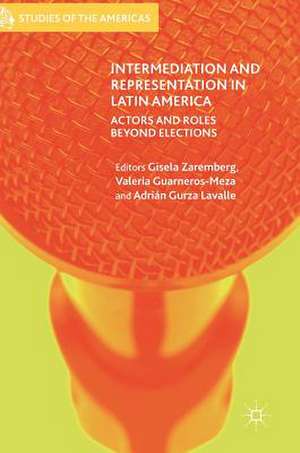Intermediation and Representation in Latin America: Actors and Roles Beyond Elections: Studies of the Americas
Editat de Gisela Zaremberg, Valeria Guarneros-Meza, Adrián Gurza Lavalleen Limba Engleză Hardback – 17 mar 2017
| Toate formatele și edițiile | Preț | Express |
|---|---|---|
| Paperback (1) | 637.28 lei 6-8 săpt. | |
| Springer International Publishing – 7 aug 2018 | 637.28 lei 6-8 săpt. | |
| Hardback (1) | 644.30 lei 6-8 săpt. | |
| Springer International Publishing – 17 mar 2017 | 644.30 lei 6-8 săpt. |
Din seria Studies of the Americas
-
 Preț: 303.28 lei
Preț: 303.28 lei -
 Preț: 357.57 lei
Preț: 357.57 lei -
 Preț: 281.48 lei
Preț: 281.48 lei -
 Preț: 308.36 lei
Preț: 308.36 lei -
 Preț: 188.66 lei
Preț: 188.66 lei -
 Preț: 305.50 lei
Preț: 305.50 lei -
 Preț: 300.85 lei
Preț: 300.85 lei - 20%
 Preț: 566.72 lei
Preț: 566.72 lei -
 Preț: 312.10 lei
Preț: 312.10 lei -
 Preț: 298.66 lei
Preț: 298.66 lei -
 Preț: 389.70 lei
Preț: 389.70 lei -
 Preț: 394.12 lei
Preț: 394.12 lei -
 Preț: 388.72 lei
Preț: 388.72 lei -
 Preț: 388.72 lei
Preț: 388.72 lei -
 Preț: 388.72 lei
Preț: 388.72 lei -
 Preț: 389.31 lei
Preț: 389.31 lei -
 Preț: 389.70 lei
Preț: 389.70 lei - 15%
 Preț: 697.65 lei
Preț: 697.65 lei -
 Preț: 392.60 lei
Preț: 392.60 lei -
 Preț: 384.31 lei
Preț: 384.31 lei - 18%
 Preț: 736.81 lei
Preț: 736.81 lei -
 Preț: 390.25 lei
Preț: 390.25 lei -
 Preț: 394.51 lei
Preț: 394.51 lei - 18%
 Preț: 733.46 lei
Preț: 733.46 lei -
 Preț: 393.74 lei
Preț: 393.74 lei -
 Preț: 388.72 lei
Preț: 388.72 lei -
 Preț: 391.61 lei
Preț: 391.61 lei -
 Preț: 391.40 lei
Preț: 391.40 lei -
 Preț: 390.08 lei
Preț: 390.08 lei -
 Preț: 388.72 lei
Preț: 388.72 lei - 15%
 Preț: 642.36 lei
Preț: 642.36 lei -
 Preț: 392.75 lei
Preț: 392.75 lei - 15%
 Preț: 503.37 lei
Preț: 503.37 lei -
 Preț: 392.37 lei
Preț: 392.37 lei - 15%
 Preț: 638.43 lei
Preț: 638.43 lei -
 Preț: 382.57 lei
Preț: 382.57 lei - 15%
 Preț: 635.65 lei
Preț: 635.65 lei -
 Preț: 388.52 lei
Preț: 388.52 lei -
 Preț: 388.72 lei
Preț: 388.72 lei -
 Preț: 383.71 lei
Preț: 383.71 lei -
 Preț: 386.81 lei
Preț: 386.81 lei -
 Preț: 387.75 lei
Preț: 387.75 lei -
 Preț: 392.60 lei
Preț: 392.60 lei -
 Preț: 388.72 lei
Preț: 388.72 lei
Preț: 644.30 lei
Preț vechi: 758.01 lei
-15% Nou
Puncte Express: 966
Preț estimativ în valută:
123.32€ • 127.09$ • 104.11£
123.32€ • 127.09$ • 104.11£
Carte tipărită la comandă
Livrare economică 03-17 martie
Preluare comenzi: 021 569.72.76
Specificații
ISBN-13: 9783319515373
ISBN-10: 3319515373
Pagini: 203
Ilustrații: XIX, 211 p. 12 illus., 3 illus. in color.
Dimensiuni: 148 x 210 x 19 mm
Greutate: 0.53 kg
Ediția:1st ed. 2017
Editura: Springer International Publishing
Colecția Palgrave Macmillan
Seria Studies of the Americas
Locul publicării:Cham, Switzerland
ISBN-10: 3319515373
Pagini: 203
Ilustrații: XIX, 211 p. 12 illus., 3 illus. in color.
Dimensiuni: 148 x 210 x 19 mm
Greutate: 0.53 kg
Ediția:1st ed. 2017
Editura: Springer International Publishing
Colecția Palgrave Macmillan
Seria Studies of the Americas
Locul publicării:Cham, Switzerland
Cuprins
1. Introduction. Beyond Elections: Representation Circuits and Political Intermediation .- 2. Political Intermediation and Public Policy in Brazil: Councils and Conferences in the Policy Spheres of Health and Women’s Rights .- 3. Establishing Intermediaries in Developing Mechanisms of Citizen Participation in La Silsa, Caracas, Venezuela .- 4. Political Rights and Intermediation: Municipal Decentralization and Democratic Innovation in Uruguay .- 5. Bolivia: “Social Control” as the Fourth State Power 1994-2015 .- 6. Citizen Security in Mexico: Examining Municipal Bureaucracy From the View of the Intermediation-Representation Debate .- 7. Conflicts of Representation and Redistribution in the Mexican Labour World .- 8. The Political-Legal Representation Circuit of Human Rights Politics .- 9. Conclusions and Future Research Agenda.
Recenzii
“Intermediation and Representation in Latin America is an inspiring and very opportune book, which helps to understand the transformations faced by representative democracy in Latin America. The volume offers directions for students and researchers in order to analyse the changes promoted by the wave of democratic innovations through a new lens.” (Yanina Welp, Democratization, Vol. 25 (5), August, 2017)
Notă biografică
Gisela Zaremberg is Research Professor at Facultad Latinoamericana de Ciencias Sociales (FLACSO), Mexico.
Valeria Guarneros-Meza is Senior Lecturer in Politics and Public Policy at De Montfort University, UK.
Adrian Gurza-Lavalle is Associate Professor in the Political Science Department at the University of São Paulo, Brazil.
Valeria Guarneros-Meza is Senior Lecturer in Politics and Public Policy at De Montfort University, UK.
Adrian Gurza-Lavalle is Associate Professor in the Political Science Department at the University of São Paulo, Brazil.
Textul de pe ultima copertă
This book shows how the introduction of intermediation is relevant in studying public policy processes, as they are increasingly accompanied by grey spaces in public and non-public arenas that cannot be categorized as purely representative or purely participative. Instead, ‘hybrid’ mechanisms are developing in the policy-making process, which bring in new actors who either are unelected while being required to represent or advocate for the common good of others or are directly elected but challenged by identity/rights-based issues of the people they are required to act in the best interest of. By addressing five different Latin American countries and a wide range of case studies—from human rights, labour relations, neighbourhood management, municipal bureaucracies, social accountability, to complex national systems of citizen participation—this volume shows the versatility and validity of CIP as a tool for analysing public policy and understanding contemporary democratic innovation in Latin America.
Caracteristici
Presents the findings of an eight-year study, drawing on case studies of intermediation and representation in Bolivia, Mexico, Brazil, Uraguay and Venezuela Offers a distinctive approach to filling the research gap in political intermediation by developing a framework, that unpacks different understandings of ‘indirectedness’ as an intrinsic feature of politics Formulates, applies and assesses a tridimensional model of political intermediation, represented through the 'cube of political intermediation', and suggests how interdisciplinary approaches can provide ideas for overcoming analytical and methodological challenges













